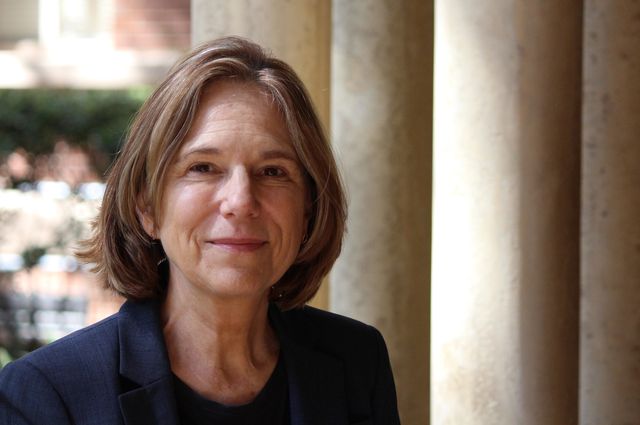Students in two global studies classes at UCLA this quarter will benefit from an eye-opening month their professor spent in Greece this past summer. In July, anthropologist Laurie Hart taught international graduate seminars on the current border crisis at the University of the Aegean on the island of Lesvos. Since 2015, 500,000 war-driven Syrian and other refugees have landed in rafts and makeshift boats on a tiny strip of beach, and the university finds itself in the middle of the crisis, sharing the island with holding camps for thousands of refugees and migrants who — now that the rest of Europe has closed its borders to them — are caught in stateless limbo.
“I think it's an important moment to recognize that Europe — and, of course, Greece itself — is not an ‘old classics’ topic, but a very contemporary urgent question,” Hart said. “The impact of migration in Europe — and the looming British exit from the European Union — will be very provocative for thinking about what a modern state is.”
Hart’s up-close and personal experience of the refugee crisis will add to the depth and breadth of the two undergraduate courses she is teaching, “Globalization, Borders and Migration” and “Understanding Violence: Global Ethnographic Perspectives,” both in the Global Studies Program of the UCLA International Institute. As an anthropologist, Hart is interested in the relationship between global structural forces and intimate experience. “For students struggling to understand migration and globalization,” she said, “anthropology offers an ethnographic perspective that helps them relate these concepts to the everyday experience of ordinary people.”
Hart joined UCLA in 2015 with a dual appointment in the global studies program and the department of anthropology. A veteran of global studies, having taught the subject for over 20 years at Haverford College, she has research interests in ethnicity, civil war, borders, displacement and migration — topics at the forefront of contemporary global politics.
Waves of refugees and migrants have been arriving in Greece since 2014, creating an enormous economic and political strain. The country was already suffering a severe economic downturn caused by the austerity policies imposed in the wake of the 2009 Greek debt crisis and subsequent European Union (EU)-negotiated bailout packages, and the EU has left Greece largely to its own devices to handle the migrants.
“While the [refugee] crisis is less visible in the international media this summer, on the ground it is very clear that the situation is both urgent and chronic,” said Hart. “The recent repressive crackdown by Turkish leader Erdogan has added to the instability of the situation for refugees.”
When teaching globalization, Hart and her students read intensively in ethnographic texts by anthropologists who have done long-term field research among people who live on territorial borders, who have crossed the border or who have experienced migration, and who analyze these border conditions from a theoretical and comparative point of view. “Our texts,” Hart said, “are geographically very diverse, from Africa, the Middle East and Asia, to the closer-at-hand U.S.-Mexican border.”
For the midterm in one of her classes, Hart assigned students to interview someone who had crossed a nation-state border and to use what they had learned from the class readings and discussion to explore their interviewee’s experience. “They did some amazing, perceptive work, often drawing on their own or their parents’ experiences of migration,” she said.
Reflecting on her summer and the magnitude of the migration flows toward Europe, Hart said, “It’s a very interesting and challenging time to be in global studies at UCLA because I have an opportunity to bring awareness of what’s going on in Europe to students who often feel it is remote from their lives.
“I would like them to see Europe in a global context as a living place that is experiencing cataclysmic events, and to understand the way in which the wars in Syria, Iraq and Afghanistan and extreme North-South inequality are affecting Europe and the U.S., as well as the ordinary lives of people everywhere,” she said.
This story was adapted from the original published by the UCLA International Institute.





